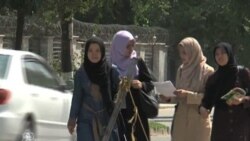UNITED NATIONS —
On this year’s International Human Rights Day, on December 10, the United Nations will mark the 20th anniversary of the signing of the Vienna Declaration, committing states to the promotion and protection of human rights for all and creating the post of U.N. High Commissioner for Human Rights.
Some things in life may be taken for granted, such as the ability to receive an education, but as the Taliban attack on teen activist Malala Yousafzai taught the world last year, school is a right that can't be taken for granted.
U.N. Secretary-General Ban Ki-moon said 57 million children worldwide do not attend school. Many of them live in conflict zones, and most are girls.
“No child should have to die for going to school. Nowhere should teachers fear to teach or children fear to learn,” said Ban.
The right to an education, the rights of children, the elimination of violence against women, and the eradication of poverty were envisioned for all people by the Vienna Declaration.
U.N. Assistant Secretary-General for Human Rights Ivan Šimonović said the 1993 declaration was a game changer.
“It was an event that really moved human rights to the forefront of the global agenda,” said Šimonović.
However, despite advances, Human Rights Watch’s Philippe Bolopion pointed out that the fight still continues.
"On a day like today, it is hard not to think about civilians trapped in Syria or in the Central African Republic who probably feel that the international community is failing them. And they are right. Despite all the progress we have seen at the U.N. in terms of putting human rights to the front, there are still tragic failures and it is often civilians who are paying the price,” said Bolopion.
Šimonović maintained that human rights abuses are often the first sign of conflict.
“If we act timely, we might be able to prevent them. The Secretary-General is just right now rolling out a new action plan called Rights Up Front. It puts human rights in the center of prevention of emerging conflict,” explained Šimonović.
Governments are responsible for protecting human rights, yet in Syria and the Central African Republic, the authorities are among those accused of atrocities.
HRW’s Bolopion recently visited the CAR and said he met many people whose relatives were killed by former rebels who are now in power.
“Too often it is the governments themselves who are responsible for very serious abuses against their population, and when that happens they need to be stopped by the international community,” said Bolopion.
On International Human Rights Day, the U.N. is honoring five rights defenders, including a Moroccan journalist and Pakistani education activist Malala Yousafzai.
Some things in life may be taken for granted, such as the ability to receive an education, but as the Taliban attack on teen activist Malala Yousafzai taught the world last year, school is a right that can't be taken for granted.
U.N. Secretary-General Ban Ki-moon said 57 million children worldwide do not attend school. Many of them live in conflict zones, and most are girls.
“No child should have to die for going to school. Nowhere should teachers fear to teach or children fear to learn,” said Ban.
The right to an education, the rights of children, the elimination of violence against women, and the eradication of poverty were envisioned for all people by the Vienna Declaration.
U.N. Assistant Secretary-General for Human Rights Ivan Šimonović said the 1993 declaration was a game changer.
“It was an event that really moved human rights to the forefront of the global agenda,” said Šimonović.
However, despite advances, Human Rights Watch’s Philippe Bolopion pointed out that the fight still continues.
"On a day like today, it is hard not to think about civilians trapped in Syria or in the Central African Republic who probably feel that the international community is failing them. And they are right. Despite all the progress we have seen at the U.N. in terms of putting human rights to the front, there are still tragic failures and it is often civilians who are paying the price,” said Bolopion.
Šimonović maintained that human rights abuses are often the first sign of conflict.
“If we act timely, we might be able to prevent them. The Secretary-General is just right now rolling out a new action plan called Rights Up Front. It puts human rights in the center of prevention of emerging conflict,” explained Šimonović.
Governments are responsible for protecting human rights, yet in Syria and the Central African Republic, the authorities are among those accused of atrocities.
HRW’s Bolopion recently visited the CAR and said he met many people whose relatives were killed by former rebels who are now in power.
“Too often it is the governments themselves who are responsible for very serious abuses against their population, and when that happens they need to be stopped by the international community,” said Bolopion.
On International Human Rights Day, the U.N. is honoring five rights defenders, including a Moroccan journalist and Pakistani education activist Malala Yousafzai.





